Whats the big deal about soft water cichlids in hard water. Rant
- Thread starter duanes
- Start date
You are using an out of date browser. It may not display this or other websites correctly.
You should upgrade or use an alternative browser.
You should upgrade or use an alternative browser.
I have noticed with my "Panamanian GTs" Andinoacara coerulropunctatus, spend most of the day grazing algae off plants, grazing detritus, and ignoring the shoal of tiny Gambusia they are housed with.I feel this is the same with a lot of South American cichlids espically Green Terrors and Discus. I have seen many people rave about how much their fish likes Northfin or how it gives them great color but these same people also seem to post questions like why is my Green Terror Bloating or having white poo. Green Terrors are primarily vegetarian with some insects also in their diet. But one look at the ingredients in Northfin will reveal why their GT is bloating. Also many people believe that GT's are soft water fish when the come from west of the andes where the water is harder. Maybe if people kept GT's in higher ph waters not so many would get internal parasites.
The Gambusia are guppy size, and would seem to be perfect size for eating for predatory cichlids, yet their numbers have not diminished in the tank, in fact have grown, and I've been able to put a number of the mosquito fish fry in my sumps to help reduce the chance of being fined by the mosquito police here.
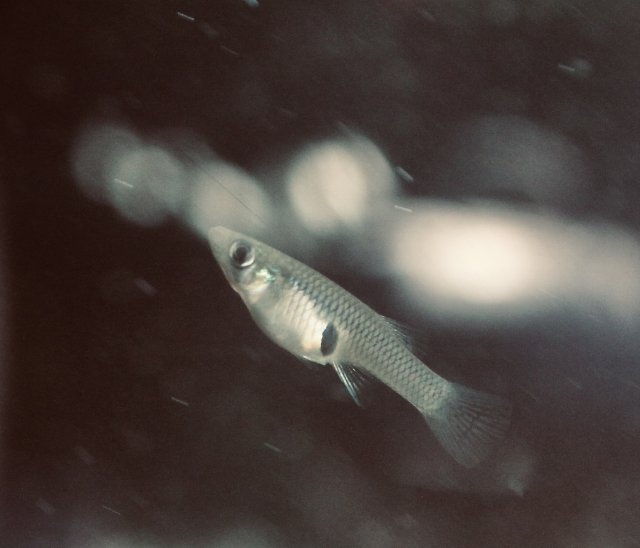
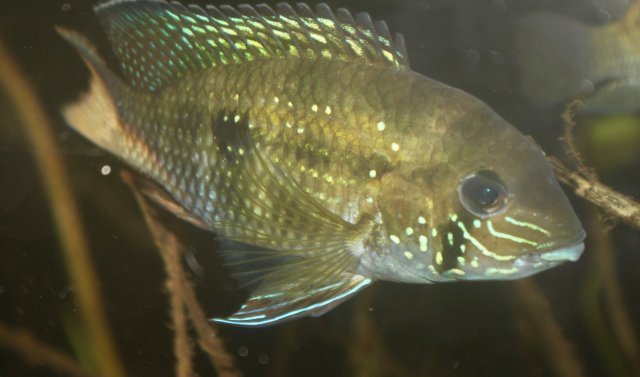
And because the more highly alkaline water on the west side of the Andes is quite different from the soft Amazonian water east of the mountains, I agree we should treat Andinoacara, festae, and the red hump Geophagines (pelligrini, steindachner i and crassilabrus).with different mind set.
I tested the river water my Andianoaacra were found in, and it was highly alkaline, and @ 8 in pH.
Back in 1960, it was thought all oscars were simply A ocellatus.What size tank, which species (if you know) and how aggressive was it? Tankmates?
I (being a 10 yer old) had them in a 35 gallon, until (even then) realized they quickly out grew it, ate all community tank mates, and ended up in a claw foot bath tub someone was tossing down the street.
Back then water changes were thought to be "bad", and it was believed terrestrial animal meat was good for cichlids, so it was no wonder they ended up scarred with HLLE.
You can raise discus in hard water, in fact breeder prefer some hardness to stabilize pH to raise juvies. But there is no chance to successfully breed discus without lowering tds to black water level because fertilization, hatching and raising larvae will always fail.discus breeders circumvent this issue by often doing 50%-100% water changes daily. with that approach people have had success with breeding discus in high ph water.
but i can see why lots of us would feel as though that's a bridge too far lol
being tank raised for generations also helps
I have visited a number of Florida fish farms. They breed discus , rams, some Geos and epistos in separate RO mixed water, but raise and acclimate older fish in harder water. Angel fish, Oscar, and some tetras, however, have no problem breed and raise in hard water. Some fish can adapt by domestication, some don’t. Is it the lack of effort by the breeders to make them adapt, or some fish are just inherently unadaptable. I don’t know.
tiger your post really got me thinking.
this part especially:
it really is a curiosity. especially considering angels and discus aren't miles apart in the animal kingdom.
so i went and did some digging on the simply discus forums and i saw all kinds of explanations.
a lot of people say that the eggs suffer from osmotic pressure and "suffocate". and then in addition to that the parents' slime coats suffer in imperfect conditions.
but by far the most interesting post i found was this one from a member with the username willie (i trimmed the post for the purpose of this thread)
really interesting stuff and maybe taking the thread on a bit of a tangent.
unfortunately for me and my poor brain it seems like everything about fish is more complicated than i'd like it to be. if that last post is correct it makes me wonder are discus unique in that way of signaling fertilization.
i suppose op is spot on when he says the way to save yourself all these headaches is to just keep the fish that like your tap water lol. although, i think i can see why others might like the challenge. each to their own i suppose.
this has definitely been my favorite thread on the forum since i joined.
this part especially:
Angel fish, Oscar, and some tetras, however, have no problem breed and raise in hard water.
it really is a curiosity. especially considering angels and discus aren't miles apart in the animal kingdom.
so i went and did some digging on the simply discus forums and i saw all kinds of explanations.
a lot of people say that the eggs suffer from osmotic pressure and "suffocate". and then in addition to that the parents' slime coats suffer in imperfect conditions.
but by far the most interesting post i found was this one from a member with the username willie (i trimmed the post for the purpose of this thread)
Discus eggs cannot be fertilize in hard water because calcium ions signal the membrane to change fluidity and block fertilization by sperm. In soft water, the egg secretes calcium ions to signal fertilization and block further sperm entry. However, this is the ONLY time when discus cannot survive in hard water.
In the entire life cycle of discus, it only requires about 45 minutes of soft water. You can purchase an R/O unit or just buy some 5 gallon water jugs.
really interesting stuff and maybe taking the thread on a bit of a tangent.
unfortunately for me and my poor brain it seems like everything about fish is more complicated than i'd like it to be. if that last post is correct it makes me wonder are discus unique in that way of signaling fertilization.
i suppose op is spot on when he says the way to save yourself all these headaches is to just keep the fish that like your tap water lol. although, i think i can see why others might like the challenge. each to their own i suppose.
this has definitely been my favorite thread on the forum since i joined.
I agree with a lot of what you posted, Duane, but at the same time I agree with neutrino as well. It's not always as simplistic as it seems on the surface. For example.....
Domestic discus do just fine in hard water with higher pH values - and no need for large daily water changes. A local discus breeder here with 2-3 thousand gallons worth of discus tanks kept and raised all of his discus in our hard water with pH 8.0. As already explained, the only thing soft water does is allow a higher success rate of eggs hatching. That's it. And his water change schedule was once a week. As he liked to say, warm water + beef = beef soup. In his latter years he fed pellets (NLS) with a treat of blood worms once or twice a week, and changed water once a week. Below are some of his Stendker grow outs raised during this period.
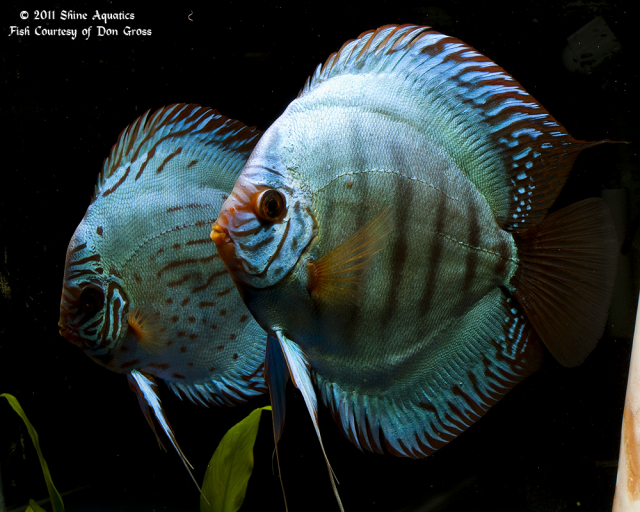
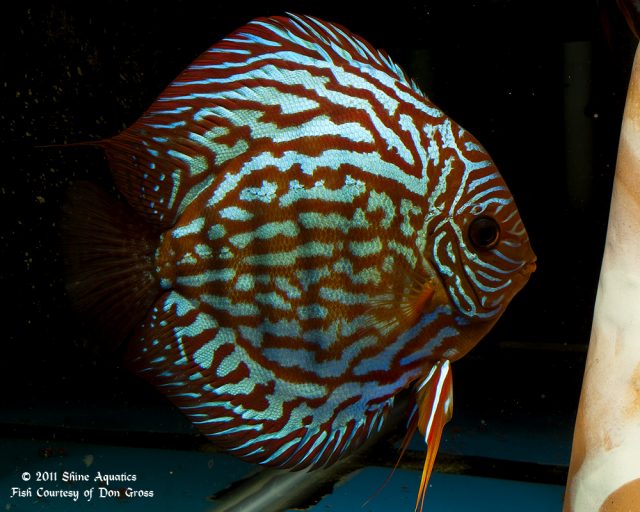
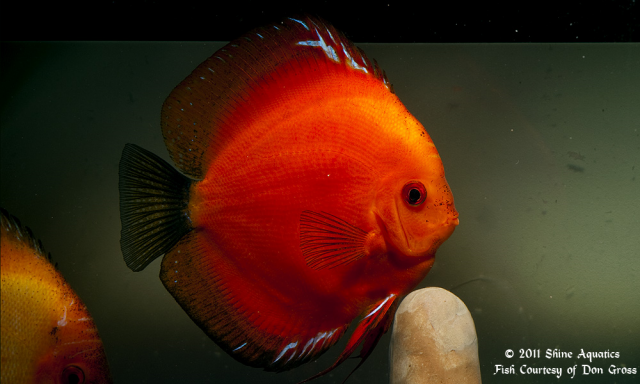
I have also heard it said ….
“But my friend raised thousands of discus in hard water”.
Many discus breeders change large amounts of water on a daily basis, sometimes up to 90%, per day, to get good growth.
This is where the 99.9999% pathogen free tap water comes into play.
Domestic discus do just fine in hard water with higher pH values - and no need for large daily water changes. A local discus breeder here with 2-3 thousand gallons worth of discus tanks kept and raised all of his discus in our hard water with pH 8.0. As already explained, the only thing soft water does is allow a higher success rate of eggs hatching. That's it. And his water change schedule was once a week. As he liked to say, warm water + beef = beef soup. In his latter years he fed pellets (NLS) with a treat of blood worms once or twice a week, and changed water once a week. Below are some of his Stendker grow outs raised during this period.



BTW - in all of the many years that I spent time swapping spit in this breeders fish room, and all of the scores of various cichlids that he bred over those many years, I never once saw a fish with HLLE. or in freshwater fish, more accurately HITH symptoms. Not one.
I think it depends just how soft. Certainly, it's not hard to difficult hardness. A reason a fish can seem healthy short term in conditions far outside their normal but not live as long has to do with the energy expenditure it takes to maintain osmotic balance. Or they need a minimum of certain minerals biochemically, whether for growth, spawning, etc. Water can be clean and they're not showing signs of illness, but they simply die early, on that I agree with Duane. Or it might affect behavior, make them more skittish, for example.
On the other hand, I've seen exaggerations of what some fish require; for example, descriptions of the African lakes as "liquid concrete". And hardness alone doesn't tell you the actual mineral profile. For example, Lake Tanganyika is relatively high in magnesium, Lake Malawi fairly low in Magnesium. I've kept kapampa gibberosa for years. They're fine in pH in the mid or upper 7s and moderate (not high) hardness, same as the Malawi cichlids I used to keep and breed. But at least for my water, adding some magnesium to my kapampa tank seems to help them release eggs with fewer issues.
A lot of people who simply match hardness would be surprised how far off they are in actual mineral profile from the native water for their fish. Again, it's a good thing most fish are adaptable and forgiving-- within reason.
Great point. I posted the following 16 yrs ago on another forum regarding tweaking water to fit Malawi cichlids ...….
I get the feeling some people have been led to believe that one has to have their PH range above 8.0, which simply isn't true. PH values as low as 7.5 have been recorded in Lake Malawi, and the water is not near as hard as most people believe, it's actually on the soft side. (4-6 dGH) Many people assume that high PH values = hard water, but in the case of Lake Malawi this isn't true.
Also, most tap water will have seasonal fluctuations, just like Lake Malawi, so I think it would be near impossible to keep all water parameters constant 365 days of the year. The trick is keeping the fluctuations from being drastic from one day to the next. I'm not sure if all of the 'new' aquarium owners realize just how drastic a change in PH from 7.6 - 8.6 is? I would prefer to see people keeping their Cichlids at a constant 7.4, than have the PH jumping back & forth between 7.4 & 8.4 every time they do a water change, and add a fist full of chemicals/buffers.
Our local tap water is usually in the PH range of 8.0, with seasonal drops as low as 7.8, and as high as 8.2. The water hardness levels are usually in the 150-180 mg/l range during spring & summer & approx
200-250 mg/l during the winter months. This is approx. twice as hard as the water in Lake Malawi, yet the fish here do very well with no additional treatments or buffers.
This is why I always suggest getting in contact with ones local water treatment plant, so that they know exactly what they are dealing with "throughout" the year. As long as the tap water changes/conditions are gradual throughout the year, the fish will do fine. But ....... IMO if someone isn't very careful with how they test their water, and how they add the buffers, it can cause MUCH more harm than just leaving the water as-is. (even if not exactly the same as the Rift lakes)
If I was to 'attempt' to tweak my local tap water to get the exact same parameters as Lake Malawi I would need to do the following:
1. Raise the PH slightly
2. Lower the overall alkalinity
3. Lower the hardness
4. Lower the conductivity
5. Lower the Calcium
5. Lower the Carbonates
6. Raise the Chloride
7. Lower the Magnesium
8. Raise the Potassium
10. Raise the Sodium
11. Lower the Sulfate
Even if I was a chemist (which I'm not) and had the proper test kits to monitor all of these conditions on a weekly basis, and had the chemicals on hand to adjust all of these parameters, can you see what a nightmare it would be to keep everything on a constant even keel 365 days of the year?
That's what I figured, the way I remember it an Oscar was just an Oscar. I too had fish in the 60s as a kid. Steel reinforced tanks, air driven, in-tank corner filters, Tetra flakes, I thought I had a monster tank when my parents got me a 55 gal, except when I'd visit Shedd Aquarium in Chicago (grew up there). I did do water changes, probably once a month. It only seemed logical to me-- river fish don't live in stagnant water. I never did buy into beef heart, chicken liver, or whatever other meat as fish food, even as a kid I was scientifically inclined and an independent thinker and it just didn't make sense or seem natural; fish eat other fish or bugs or algae, not cows. So I fed brine shrimp and flakes. Sure, if I was keeping northern pike I'd have fed them frogs or mice, but the thought of my guppies or small acara or delicate angelfish eating cow hearts felt wrong. Plus flakes were easy.Back in 1960, it was thought all oscars were simply A ocellatus.
I (being a 10 yer old) had them in a 35 gallon, until (even then) realized they quickly out grew it, ate all community tank mates, and ended up in a claw foot bath tub someone was tossing down the street.
Back then water changes were thought to be "bad", and it was believed terrestrial animal meat was good for cichlids, so it was no wonder they ended up scarred with HLLE.
Exactly!!!Great point. I posted the following 16 yrs ago on another forum regarding tweaking water to fit Malawi cichlids ...….
I get the feeling some people have been led to believe that one has to have their PH range above 8.0, which simply isn't true. PH values as low as 7.5 have been recorded in Lake Malawi, and the water is not near as hard as most people believe, it's actually on the soft side. (4-6 dGH) Many people assume that high PH values = hard water, but in the case of Lake Malawi this isn't true.
Some persistent aquarium lore makes me crazy, but you can't convince people. It's the same with discus. Blue/brown discus live in water with pH from 6.0 to 7.8, temperatures down to the mid 70s, comparatively high conductivity, are rarely found in black water. It's the green and heckle discus that come from very sott, low ph water. Where do you learn this? Read Heiko Bleher, science literature describing actual field work, don't believe everything the average discus keeper says, they're just repeating what they've been told by other average discus keepers.


